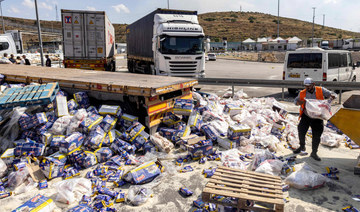GAZA CITY, Gaza Strip: Thousands of displaced Palestinians in northern Gaza have sought refuge in what was once the territory’s biggest soccer arena, where families scrape by with little food or water as they try to keep one step ahead of Israel’s latest offensive.
Their makeshift tents hug the shade below the stadium’s seating, with clothes hung out to dry across the dusty, dried-up soccer field. Under the covered benches where players used to sit on the sidelines, Um Bashar bathes a toddler standing in a plastic tub. Lathering soap through the boy’s hair, he wiggles and shivers as she pours the chilly water over his head, and he grips the plastic seats for balance.

This image from video shows a woman bathing her child Friday, July 5, 2024 in Gaza City, Gaza. (AP)
They’ve been displaced multiple times, she said, most recently from Israel’s renewed operations against Hamas in the Shijaiyah neighborhood of Gaza City.
“We woke up and found tanks in front of the door,” she says. “We didn’t take anything with us, not a mattress, not a pillow, not any clothes, not a thing. Not even food.”
She fled with about 70 others to Yarmouk Sports Stadium — a little under 2 miles (3 kilometers) northwest of Shijaiyah, which heavily bombed and largely emptied early in the war. Many of the people who ended up in the stadium say they have nothing to return to.

A Palestinian couple holds their children as they walk through debris in Khan Yunis in the southern Gaza Strip on July 4, 2024, amid the ongoing conflict between Israel and the Palestinian Hamas militant group. (AFP)
“We left our homes,” said one man, Hazem Abu Thoraya, “and all of our homes were bombed and burned, and all those around us were as well.”
Hundreds of thousands of people have remained in northern Gaza, even as Israeli troops have surrounded and largely isolated it. However, aid flows there have improved recently, and the UN said earlier this week that it is now able to meet people’s basic needs in the north. Israel says it allows aid to enter Gaza and blames the UN for not doing enough to move it.
Still, residents say the deprivation and insecurity are taking an ever-growing toll.
“There is no safe place. Safety is with God,” said a displaced woman, Um Ahmad. “Fear is now felt not only among the children, but also among the adults. ... We don’t even feel safe walking in the street.”

























